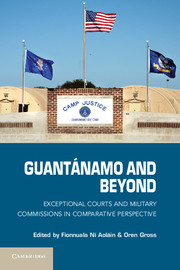Book contents
- Frontmatter
- Contents
- Contributors
- Acknowledgments
- Introduction: Guantánamo and Beyond
- Part I Military Commissions and Exceptional Courts in the United States
- 1 The Development of an Exceptional Court
- 2 Military Commissions in Historical Perspective
- 3 Contemporary Law of War and Military Commissions
- 4 Military Commissions and the Paradigm of Prevention
- 5 Prevention, Detention, and Extraordinariness
- 6 In Defense of Federal Criminal Courts for Terrorism Cases in the United States
- 7 Exceptional Courts and the Structure of American Military Justice
- 8 Exceptional Courts in Counterterrorism
- Part II Exceptional Courts and Military Commissions Elsewhere
- Part III International Law, Exceptional Courts, and Military Commissions
- Index
- References
6 - In Defense of Federal Criminal Courts for Terrorism Cases in the United States
Published online by Cambridge University Press: 05 June 2014
- Frontmatter
- Contents
- Contributors
- Acknowledgments
- Introduction: Guantánamo and Beyond
- Part I Military Commissions and Exceptional Courts in the United States
- 1 The Development of an Exceptional Court
- 2 Military Commissions in Historical Perspective
- 3 Contemporary Law of War and Military Commissions
- 4 Military Commissions and the Paradigm of Prevention
- 5 Prevention, Detention, and Extraordinariness
- 6 In Defense of Federal Criminal Courts for Terrorism Cases in the United States
- 7 Exceptional Courts and the Structure of American Military Justice
- 8 Exceptional Courts in Counterterrorism
- Part II Exceptional Courts and Military Commissions Elsewhere
- Part III International Law, Exceptional Courts, and Military Commissions
- Index
- References
Summary
DEBATE OVER THE USE BY THE U.S. GOVERNMENT OF MILItary commissions rather than federal criminal courts for terrorism cases is ultimately about how best to situate and respond to the threat of international terrorism as a matter of law and policy. After the terrorist attacks of September 11, 2001, it was thought by many, including top policy makers in the Bush administration, that the United States had experienced a paradigm-shifting event that created a new post-9/11 legal world. The old paradigm – pre-9/11 thinking – was one in which terrorists were generally considered common criminals, subject to law-enforcement action. After 9/11 arguments began to take shape favoring a law of armed-conflict paradigm for detention and prosecution of terrorism suspects.
The Bush administration's new modified war paradigm was extraordinary, indeed, revolutionary in two respects. First, its breadth was unprecedented. The war spanned the globe and construed “terror,” “terrorism,” and “terrorists” as the enemy. Second, the administration asserted all the powers of wartime law, including the right to detain without charge or trial. Notably, suspected terrorists were considered unlawful combatants who did not merit the rights typically afforded to either combatants or civilians detained in armed conflict.
- Type
- Chapter
- Information
- Guantánamo and BeyondExceptional Courts and Military Commissions in Comparative Perspective, pp. 137 - 162Publisher: Cambridge University PressPrint publication year: 2013



